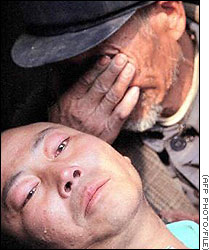June 28, 2002 Posted: 7:31 AM EDT (1131 GMT)

An elderly man cries beside his dying son who has been suffering from AIDS since 1999 when he sold his blood
BEIJING, China -- In a damning stocktake of China's efforts to halt a looming epidemic, a U.N. report says the country faces a "titanic peril" if it does not change the way it is fighting AIDS.
China is "on the verge of a catastrophe that could result in unimaginable suffering, economic loss and social devastation," said the 89-page report titled "HIV/AIDS: China's Titanic Peril."
Government data last year showed 30,736 people were carrying the HIV virus, 1,594 had full-blown AIDS and 684 people died from illnesses related to the disease.
But the U.N. report says this is probably only the tip of the iceberg, estimating that as many as 1.5 million Chinese had AIDS last year.
The figure could soar to 10 million by 2010 if no effective countermeasures are taken, UNAIDS has said. Beijing went public with its fight against AIDS last year in the wake of a rampant spread of HIV in rural Henan province, where families who sold their blood caught the killer virus.
The government also set up safe blood banks and held a first-ever AIDS conference.
But the U.N. report said Beijing had not done enough to educate the public about AIDS and how it is spread, with many Chinese still believing it can be contracted through mosquito bites or shaking hands.
It blamed a lack of commitment and leadership by government officials, insufficient resources, and a crumbling public health system for a slow response.
The report called on government leaders to take urgent steps, like the promotion of sterile injections and safe sex to prevent its spread.
The study warned that sexual intercourse is fast catching up as a means of infection in China, which reported its first AIDS case in 1985, threatening to spill into the general population.
While China has yet to respond to the study, Shen Jie, director of the National Center for AIDS Prevention and Control, told the official China Daily they understood how serious the situation is.
But the biggest challenge they faced was trying to implement AIDS control strategies set by the central government, she said.
Category: Falun Dafa in the Media





